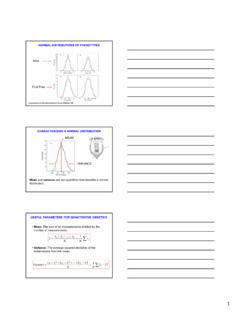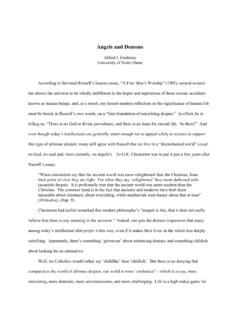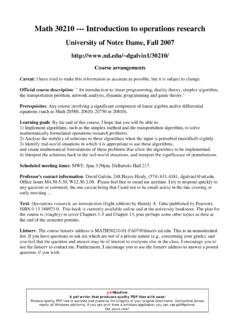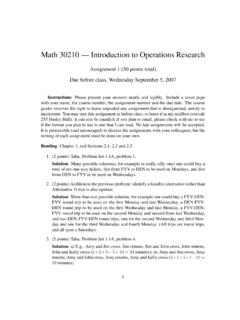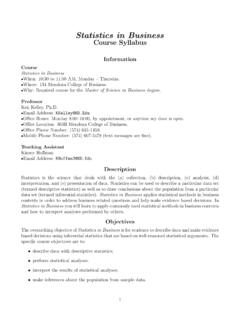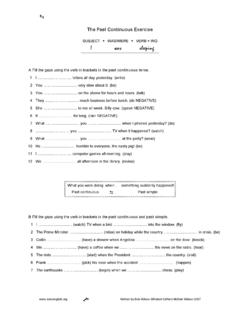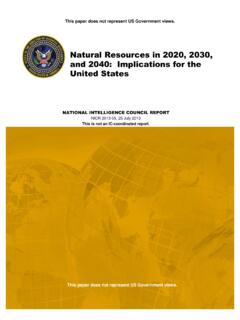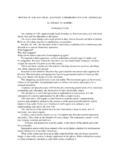Transcription of Kant’s ethics
1 Kant s ethicsSo far in our discussion of ethics we have been focusing on different versions of consequentialism - the view that one is morally obliged to pursue the course of action which, of the available alternatives, will produce the best outcome. Last time we focused on objections to consequentialism which turn, in part, on that view s indifference to the way in which the consequences of an action are brought objections might suggest that we should develop our ethical theory from a different starting point than the consequentialist; perhaps we should focus not on the consequences of our actions, but rather on the actions themselves in determining what we morally ought to do. This line of thought was developed by the author of one of the great non-consequentialist moral systems, Immanuel the selection from Kant s book, The Groundwork of the Metaphysics of Morals, which we read for today, Kant begins with this claim:The question which Kant then tries to answer is: what is it for a will to be good?
2 We have already seen the consequentialist s answer to this question: according to a consequentialist, for a will to be good is for it to aim at acting so as to produce the best possible state of affairs. In this sense, the consequentialist thinks that what is good without qualification are states of affairs; good wills are defined in terms of the intention to produce these good states of to Kant, this gets things exactly backwards:This tells us what Kant denies: he denies that we can explain what makes a will good in terms of the consequences that will brings about. But then what does make a will a good will?What makes a will good is its conformity with the moral law, which Kant called the categorical to Kant, this gets things exactly backwards:This tells us what Kant denies: he denies that we can explain what makes a will good in terms of the consequences that will brings about.
3 But then what does make a will a good will?What makes a will good is its conformity with the moral law, which Kant called the categorical Kant distinguishes the moral law - the categorical imperative - from other rules of action, which he calls hypothetical imperatives. An example of a hypothetical imperative is: Get something to drink, if you re thirsty and don t have any other pressing obligations. This is a hypothetical imperative because it tells us what we should do, given that certain other conditions are satisfied. The categorical imperative is not like this: it, as Kant says, enjoins the conduct immediately. The categorical imperative tells us what we are morally obliged to do, period - no matter what. This tells us about the status of the categorical imperative - that it tells us what we must do, no matter what - but what does the categorical imperative, itself, say?
4 Kant thought that there was exactly one moral rule, and that it can be stated as follows:What makes a will good is its conformity with the moral law, which Kant called the categorical Kant distinguishes the moral law - the categorical imperative - from other rules of action, which he calls hypothetical imperatives. An example of a hypothetical imperative is: Get something to drink, if you re thirsty and don t have any other pressing obligations. This is a hypothetical imperative because it tells us what we should do, given that certain other conditions are satisfied. The categorical imperative is not like this: it, as Kant says, enjoins the conduct immediately. The categorical imperative tells us what we are morally obliged to do, period - no matter what. This tells us about the status of the categorical imperative - that it tells us what we must do, no matter what - but what does the categorical imperative, itself, say?
5 Kant thought that there was exactly one moral rule, and that it can be stated as follows:Kant calls this the formula of universal law. Your maxim is your reason for acting. The formula of universal law therefore says that you should should only act for those reasons which have the following characteristic: you can act for that reason while at the same time willing that it be a universal law that everyone adopt that reason for best way to understand what this means is by looking at Kant s discussion of an action which violates the formula of universal calls this the formula of universal law. Your maxim is your reason for acting. The formula of universal law therefore says that you should should only act for those reasons which have the following characteristic: you can act for that reason while at the same time willing that it be a universal law that everyone adopt that reason for best way to understand what this means is by looking at Kant s discussion of an action which violates the formula of universal s line of reasoning here appears to be this: if I consider the maximPromise to get money whenever I need it with no intention of paying it a universal law, then I imagine a scenario in which everyone is constantly making false promises.
6 But in this sort of scenario, the convention of promising would cease to exist: after all, no one would have any reason to lend money on the basis of promises if such promises are never kept. So in such a world it would be impossible to act on this could this line of reasoning be used to show that lying, in general, violates the formula of universal law?Our discussion so far is already enough to bring out some important contrasts between Kant s ethics and the consequentialist ethical systems we have calls this the formula of universal law. Your maxim is your reason for acting. The formula of universal law therefore says that you should should only act for those reasons which have the following characteristic: you can act for that reason while at the same time willing that it be a universal law that everyone adopt that reason for best way to understand what this means is by looking at Kant s discussion of an action which violates the formula of universal s line of reasoning here appears to be this: if I consider the maximPromise to get money whenever I need it with no intention of paying it a universal law, then I imagine a scenario in which everyone is constantly making false promises.
7 But in this sort of scenario, the convention of promising would cease to exist: after all, no one would have any reason to lend money on the basis of promises if such promises are never kept. So in such a world it would be impossible to act on this could this line of reasoning be used to show that lying, in general, violates the formula of universal law?Our discussion so far is already enough to bring out some important contrasts between Kant s ethics and the consequentialist ethical systems we have , Kant s ethics tells you, in the first instance, what morality forbids you from doing. But it does not tell you what you ought to do in every case; some actions might be morally praiseworthy even though not doing them would not be contrary to the Formula of Universal Law, and hence not morally forbidden. These actions are, therefore, neither morally required nor morally forbidden.
8 For the consequentialist, on the other hand, one must always do what will bring about the best consequences: so (excluding ties) every action is either morally required or morally , according to the consequentialist, the rightness or wrongness of a particular action depends on which action, in these particular circumstances, would lead to the best outcome. According to Kant, by contrast, the rightness or wrongness of acting from a particular maxim just depends on the type of maxim that it is. If making false promises, or lying, is sometimes morally forbidden, then it is always morally last point -- that the rightness or wrongness of an action just depends on the type of maxim from which one is acting, rather than on the consequences of this particular action -- explains why Kantian ethics yields quite different results about what we ought to do than the sorts of consequentialist views we discussion so far is already enough to bring out some important contrasts between Kant s ethics and the consequentialist ethical systems we have , Kant s ethics tells you, in the first instance, what morality forbids you from doing.
9 But it does not tell you what you ought to do in every case; some actions might be morally praiseworthy even though not doing them would not be contrary to the Formula of Universal Law, and hence not morally forbidden. These actions are, therefore, neither morally required nor morally forbidden. For the consequentialist, on the other hand, one must always do what will bring about the best consequences: so (excluding ties) every action is either morally required or morally , according to the consequentialist, the rightness or wrongness of a particular action depends on which action, in these particular circumstances, would lead to the best outcome. According to Kant, by contrast, the rightness or wrongness of acting from a particular maxim just depends on the type of maxim that it is. If making false promises, or lying, is sometimes morally forbidden, then it is always morally last point -- that the rightness or wrongness of an action just depends on the type of maxim from which one is acting, rather than on the consequences of this particular action -- explains why Kantian ethics yields quite different results about what we ought to do than the sorts of consequentialist views we , for example, that a judge knows that the defendant in a capital case is innocent, but also knows that not finding the defendant guilty and sentencing him to death will result in riots in which many will be killed.
10 What would a consequentialist say about this sort of case? How about the Kantian?In this sort of case, it might seem that the Kantian gets things right, and the consequentialist gets things wrong. But there are other cases where things might not seem to so clear. Here is one such example:You re living in Nazi Germany, and hiding a Jewish family in your basement. The authorities come to the door, and ask you whether you are hiding a Jewish family in your house. You know that they will believe you if you tell them that you are not; it is just a random check. What should you do?What does the Kantian say about this sort of case? How about the consequentialist? What should we say?Kant himself was well aware of this consequence of his theory, and he believed it to be correct. Thinking that one should lie to save someone s life is, for Kant, making a mistake about the nature of the moral law.


